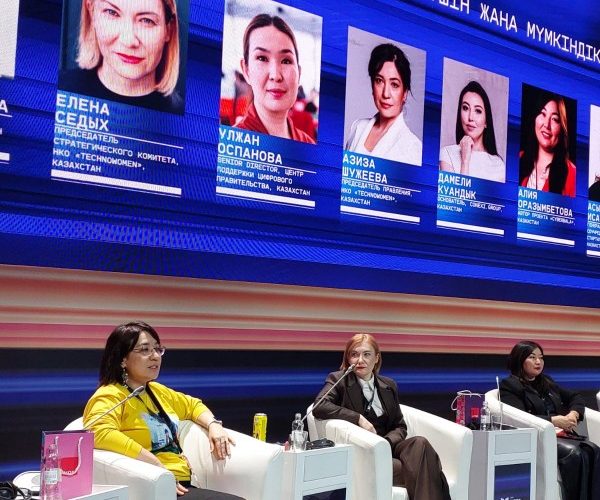
Almaty, January 31, 2025 – The Digital Almaty 2025 forum hosted a session titled “New Opportunities for Women in the Age of AI”, where leading experts discussed the development and prospects of Artificial Intelligence (AI). The session was moderated by Bikesh Kurmangaliyeva, Member of the Board, NGO “TechnoWomen”, Kazakhstan
One of the key issues of the event was the role of women in digital business and AI projects. This topic was presented by Elena Sedykh, a serial entrepreneur, venture investor, founder of the Dogovor 24 project and Chairperson of the TechnoWomen Strategic Council. In her presentation, she emphasized the importance of women’s participation in technology development and outlined a number of critical challenges related to gender bias and the limited representation of women in AI.
Technology Trends and the Impact of AI
According to research by the World Economic Forum, 86% of respondents believe that artificial intelligence will have the greatest impact on business by 2030. Generative AI is rapidly spreading in developed countries and can significantly increase productivity, but it also creates risks of unemployment and social inequality.
Gender Bias and Women’s Issues in AI
UN Women emphasizes that digital technologies can help break down barriers that prevent women from accessing education, healthcare, and economic opportunities. However, gender bias in AI remains a serious problem associated with the use of data containing gender stereotypes: AI training data often reflects traditional social roles, which leads to algorithms unconsciously reproducing stereotypes.
Lack of diversity in development teams: The predominantly male composition of AI development teams means that gender aspects may be ignored in development.
Limited access to funding and mentorship for women: Women in the tech industry continue to face challenges in accessing investment and professional support.
Lack of role models: The lack of visible examples of successful female leaders in AI makes it difficult to attract new female professionals to high tech.
Solutions
Elena Sedykh noted that in order to eliminate gender bias and increase the number of women in the AI industry, it is necessary to:
Collect diverse data for AI training, ensuring balance and inclusivity.
Audit AI systems to identify and eliminate discriminatory patterns.
Create mentoring programs and initiatives for women in tech.
Fund female AI startups and encourage investment in inclusive technologies.
Change the corporate culture of companies, promoting greater diversity in development teams.
Raise awareness and shape inclusive strategies for women in AI.
Digital Almaty 2025 Forum confirmed that the future of women in AI depends on collective efforts. Call to action: learn, drive change, build support networks and promote gender equality in the digital sphere.

